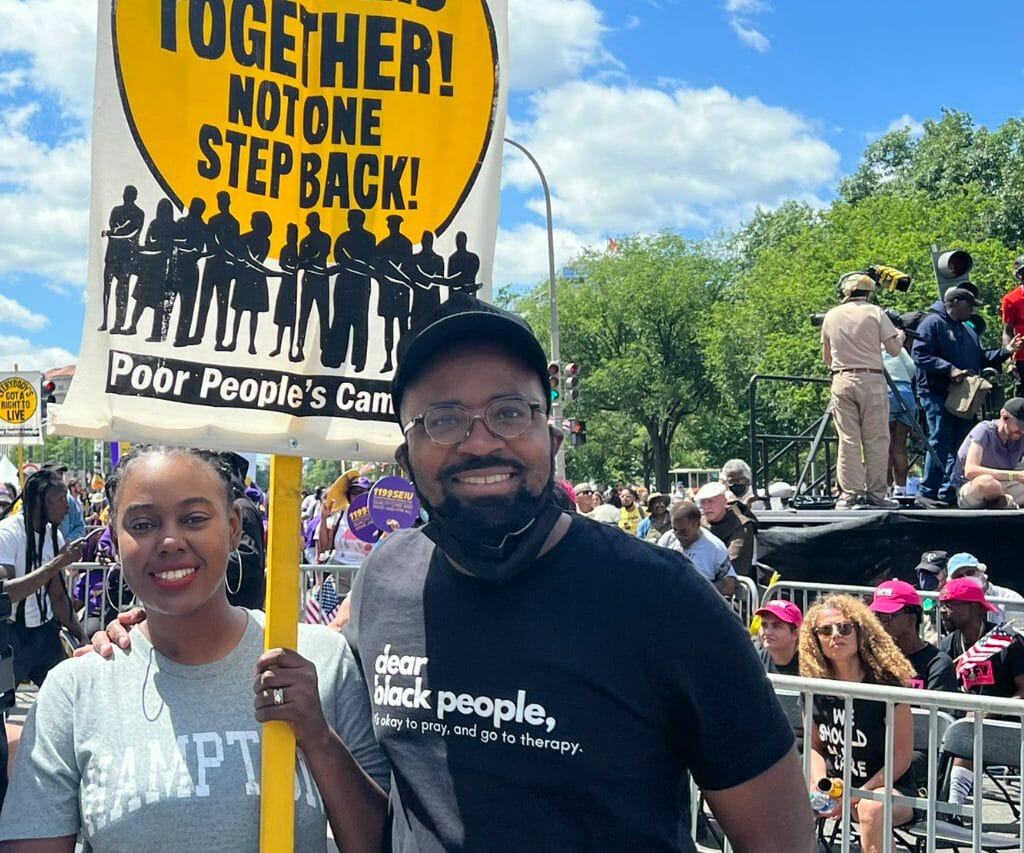To Reverend Andrew Wilkes, inequality is a dire and immoral injustice. The pastor and political scientist spends every Sunday considering how to build a more equitable economy with his congregation, called the Double Love Experience, in Brooklyn, New York.
"From unemployment to healthcare outcomes, virtually every issue hits poor folks the hardest," he explains. By consequence, pastors like him have more prayers to shepherd, more funerals to perform, more concern to ease: "not because it's God's will or because fate declared it, but because identifiable policy choices – fiscal and monetary policy – have created burdens on people that should be lifted."
The lapse of pandemic-era protections on housing and paychecks, the unrealized necessity of universal healthcare, the prohibitive costs of higher education, and the destruction of voting rights and our environment are all inequality-preserving choices, ones that "haunt the lives of folk who are of faith."
A similar cause for mourning? The pandemic's unconscionable inflation of billionaires' net worth – which Inequality.org reports has surged by nearly $2 trillion in the last two years. Our richest are "not only purchasing jets and spaceships," Reverend Wilkes emphasizes. They're purchasing and capturing our government, which "shrinks the scope of participatory democracy and our autonomy." In simpler words: "It's not okay."
Enter the visionary Third Reconstruction Agenda and multiracial coalition of the Poor People's Campaign, dedicated to asserting the reality faced by 140 million poor and low-wealth Americans – and their right to dignified life.
The Poor People's Campaign calls for a moral, political revival to vanquish the evils of systemic racism, poverty, ecological devastation, the war economy and militarism, and distorted Christian nationalism. Articulating these evils' intertwined effects, the Campaign promotes an ecosystem of policies – from investment in green jobs to accurate data collection on poverty, fully funded social welfare programs, and divesting from war – that would combat inequality from both the bottom up and the top down.
Reverend Wilkes connects with the "interwoven, indivisible sense of justice" coursing through the campaign's demands, sustained organizing (led by Reverends Dr. William J. Barber II and Dr. Liz Theoharis), and broad base of association. Along with his wife and co-pastor, Reverend Dr. Gabby Cudjoe-Wilkes, he prepared to travel with members of their congregation to the nation's capital for the Campaign's June 18 Moral March on Washington and to the Polls.

Reverend Dr. Gabby Cudjoe-Wilkes and Reverend Andrew Wilkes at the Poor People's Campaign's Moral March.
Kicking off a liberatory Juneteenth weekend and a monthslong push to champion poor Americans' fundamental rights come Election Day, the Moral March drew Americans from over 30 states – across races, backgrounds, and creeds.
"Marching is not just for a moment but for a movement. Not just preaching to the choir, but expanding the choir," says Reverend Wilkes, "and building the kind of density that can exercise pressure in the fall, so that when people take office in January, they know we don't only want to take pictures: We want to see the poetry of the campaign become the prose of law."
For Reverend Wilkes, ideal markers of the Moral March's success would be material policy gains: Congressional implementation of the Poor People's Campaign's Third Reconstruction Resolution (already sponsored by a handful of Progressive Caucus Democrats, who met with poor testifiers at a congressional briefing earlier in the week), modernized living wage laws and federal job guarantees, and protected voting rights. He hopes to observe incremental and transformational change at once, driven by the Poor People's Campaign's ethic of "doing M.O.R.E." – mobilizing, organizing, registering, and educating – for those with urgent needs.
By the Moral March's end, over 100,000 participants had gathered, listened, spoken, sung, and collectively resolved for change. Reverend Wilkes felt energized. "It was the revival of inspiration and focused movement direction that our heads and hearts, indeed our souls, needed."
"I'm taking the songs, policy demands, and inspiration back to New York," he reflected, "to continue the patient, sacred work – alongside so many others – of organizing, building infrastructure, and collectively pushing for the public goods that all God's people inherently deserve."



No comments:
Post a Comment